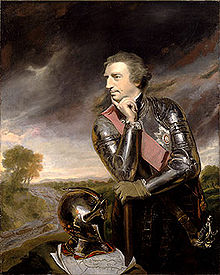Jeffery Amherst, 1st Baron Amherst
P.S. I will try to inocculate the Indians by means of Blankets that may fall in their hands, taking care however not to get the disease myself. As it is pity to oppose good men against them, I wish we could make use of the Spaniard's Method, and hunt them with English Dogs. Supported by Rangers, and some Light Horse, who would I think effectively extirpate or remove that Vermine.
In response, also in a postscript, Amherst replied:
P.S. You will Do well to try to Innoculate the Indians by means of Blankets, as well as to try Every other method that can serve to Extirpate this Execrable Race. I should be very glad your Scheme for Hunting them Down by Dogs could take Effect, but England is at too great a Distance to think of that at present.
There has been some debate as to whether this plan was actually enacted with no consensus among historians. The argument against the proposition that the plan was implemented on Bouquet's orders includes the fact that Bouquet had never had smallpox himself and was reluctant to enact the plan, as indicated by his postscript. In addition, there exists no communication by Bouquet to Fort Pitt's commander of this plan. However, as historians Elizabeth Fenn and Benedict Kiernan have shown, "Fort Pitt had anticipated these orders. Reporting on parleys with Delaware chiefs on June 24, a trader wrote: '[We] gave them two Blankets and an Handkerchief out of the Small Pox Hospital. I hope it will have the desired effect.' The military hospital records confirm that two blankets and handkerchiefs were 'taken from people in the Hospital to Convey the Smallpox to the Indians.' The fort commander paid for these items, which he certified 'were had for the uses above mentioned.' Historian Elizabeth Fenn has documented 'the eruption of epidemic smallpox' among Delaware and Shawnee Indians nearby, about the time the blankets were distributed."
Jeffrey Amherst and Smallpox Blankets
These letters also discuss the use of dogs to hunt the Indians, the so-called "Spaniard's Method," which Amherst approves in principle, but says he cannot implement because there are not enough dogs. In a letter dated 26 July 1763, Bouquet acknowledges Amherst's approval [125k] and writes, "all your Directions will be observed."
Amherst's correspondence during this time includes many letters on routine matters, such as officers who are sick or want to be relieved of duty; accounts of provisions on hand, costs for supplies, number of people garrisoned; negotiations with provincial governors (the army is upset with the Pennsylvania assembly, for example, for refusing to draft men for service); and so on. None of these other letters show a deranged mind or an obsession with cruelty. Amherst's venom was strictly reserved for Indians.
Whether it was relocation, allotment, or termination, US policies must be understood with that in mind. The goal was to eliminate the Indians--by transforming them into non-Indians or by killing them.
For more on the subject, see The Facts About Blankets with Smallpox.


No comments:
Post a Comment